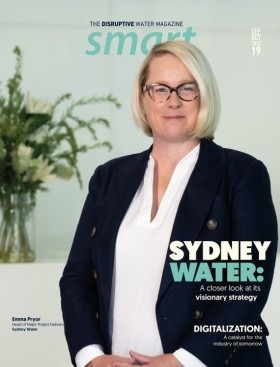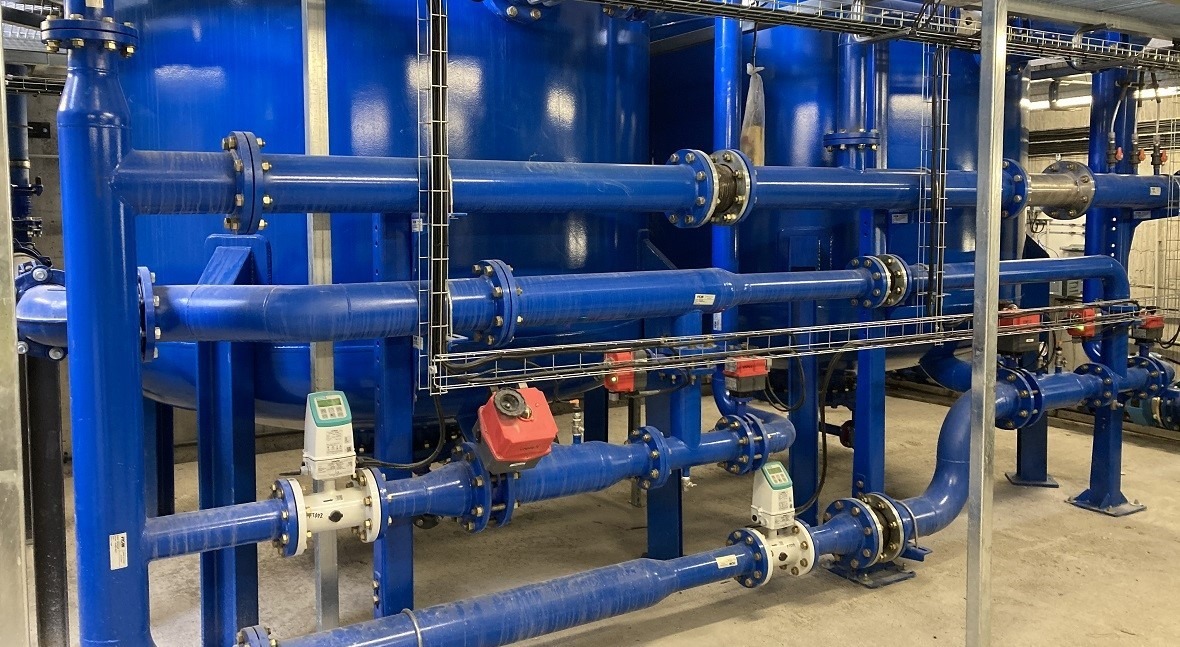What data can do for water

IoT technologies and data analysis are key for performance and efficiency improvement in water management, ensuring water quality complies with increasing standards, energy savings are realized, and sustainability goals are reached.
HMS Networks, a leading company in industrial information and communication technology (ICT), is a key partner for companies in the water sector who need to start their digitalization journey. Its solutions have been connecting devices, machines, and systems since the company’s foundation, and currently, more than 9 million systems are communicating with HMS devices. In this interview, Xavier Cardeña, Water Market Development Manager, currently responsible for the Water sector at HMS Networks Continental Europe, gives an overview of HMS’ solutions and experience.
What are the main challenges facing water management at the moment, and what role can ICT play to help address these challenges?
I would say that the three main challenges are the new regulations to which companies must adapt to; the increasing wastewater production by manufacturing companies; and the scarcity of freshwater with a projected gap between global water supply and demand to reach 40% by 2030 according to the World Economic Forum.
Consider Data as a raw material that brings transparency and visibility of everything that happens in a water treatment plant
Important investments need to be considered to manage those challenges, especially in equipment and energy. ICT is key to managing those challenges because now, besides the tangibles of raw material in water treatment there is a new hidden one called “Data”. Data brings transparency and visibility of everything that happens in the plant, but to achieve this, systems need to be connected securely and efficiently. As an example, a company can reduce maintenance costs and understand how the equipment is operating without the need to be physically present on-site thanks to a secure remote access connection, saving a lot of money both during commissioning and throughout the life cycle of the installation and being able to respond much faster to problems, reducing downtime with network monitoring tools, and increasing system availability because if a deviation or malfunction occurs, the person in charge – no matter the location - will immediately receive an alert notification on his/her cell phone for an early reaction. It is estimated that 30 to 80% of trips to plants can be saved in this way. Data combined with analytics help companies understand the behaviour of the systems, optimize processes to eliminate weaknesses and manage energy consumption, identify opportunities to improve efficiency, and set targets and action plans to reduce consumption. It is estimated that thanks to IoT technology it is possible to reduce energy consumption by between 15% and 35%, depending on the type of process.
Can you tell us about the solutions HMS Networks offers for the water industry?
All HMS products connect hardware and software in one way or another — helping users become more connected, productive, and sustainable. HMS solutions allow devices, machines and systems to talk to each other or with SCADA/MES and cloud systems. Our industrial gateway Ewon Flexy with the cloud-based secure Talk2M service allows system providers an effective and sustainable support to their customers using remote access, keeping an eye on machine performance, and easily integrating machine data to any cloud-based industrial application.
With IoT technology it is possible to reduce energy consumption by between 15% and 35%, depending on the type of process
Our Anybus Gateways are used to integrate systems and machines that do not share the same protocol, such as Ethernet IP to Profinet or Modbus. Many of our customers that sell industrial wastewater plants or machines use a gateway to know what is happening in the production lines to adapt the WW plant to the expected workload. Our Anybus Wireless line is mainly used to avoid cabling where it is difficult to install, to save maintenance and installation costs or to push data to the cloud with Low power-based protocols such as NB-IoT, and Anybus embedded is a solution to provide industrial communication to any host-based devices such as metering pumps, dosing systems, valve controllers, drives, etc… Last but not least, our new Anybus Diagnostics product line includes network diagnostics with permanent monitoring and troubleshooting solutions to ensure the availability and reliability of the systems.
We are also ready for the challenges of the future, with new digital technologies in a connected world with remote sensing, AI, machine learning, and of course 5G technology.
Where in the world is HMS Networks active in the water sector? Could you highlight some of the projects you are involved with?
Our products are already being used in thousands of applications in the sector in the five continents. One very common use case is to integrate data from machines and systems to cloud platforms for analytics, examples like the company Envirochemie with an integration of Ewon Flexy to their OPSCTRL platform, or Veolia Water Technologies which uses our Ewon IOT gateways to remotely access their machines securely and monitor the performance of their systems anytime, anywhere. By collecting data from this equipment, they get valuable information and insights, helping them in the improvement of the operational efficiency as well as reducing the carbon footprint of their clients and making these technologies more sustainable.
Also, the German company Siwatec builds container-based drinking water that is remotely monitored thanks to Ewon Flexy and our Talk2M service for secure communication.
HMS, as a leading company in information technology and industrial communications, has cyber security as a top design priority
Many customers are using also HMS products to integrate systems with different protocols, like Durapipe which uses our Anybus gateways to provide a simple interface from the valve’s standard RS232 protocol to PROFIBUS. Also Device Manufacturers who need to incorporate industrial communications directly in their device, like the company CG Drives that uses our embedded Anybus CompactCom — a “pluggable” communication module enabling their drives and soft starters to communicate with many different industrial networks with little effort.
Another interesting case to keep the systems running has been applied by the Rijnland Water Control Board which uses our Anybus Diagnostics line of products to have online monitoring and diagnostics of the section that manages the controls of the blower and the power in the aeration tank to avoid any future malfunctions.
One of the great challenges of the digital transformation is cybersecurity. What measures can be taken to guarantee the protection of services and infrastructure?
Cybersecurity in the water sector is a major topic. In fact, EU Directive 2022/2555, also known as NIS2, considers drinking water and wastewater as sectors of High Criticality, and companies are declared as Essential entities, which means that they must take technical, operational, and organizational measures to manage the risks posed to the security of network and information systems.
Water treatment plants have a long-life span – 25 to 30 years – so it’s common to find systems built in the last century where cybersecurity was not considered at all. In many cases not even system architecture diagrams or a detailed inventory of the assets is available. So, I would recommend starting with a cybersecurity assessment to understand what the vulnerabilities and the risks are, and for new projects, consider the cybersecurity by design of the installation, and rely on certified products and expertise of companies.

HMS, as a leading company in information technology and industrial communications, has cyber security as a top priority in the design of its products. Our “secure by hardware” devices and cloud service are ISO27001 certified, which guarantees continuous improvement in Information Security, and with a complete defense-in-depth strategy, including network segmentation, data encryption, authentication policies, etc.
What are your company’s business priorities for the next 5-10 years?
The water market is one of the sectors that we consider as key in the coming years. The environment is one of the three focus areas in our 2025 strategy. As a company, we can offer a lot of sustainability gains for our customers as they can use our products to reduce service trips and optimize energy use. But we can also do a lot in our operations to reach our goal of becoming CO2 net positive in 2025. This is part of our strategy to fulfill our vision to make HMS the world’s greatest industrial ICT company.
Benefits and opportunities of remote monitoring of a container-based drinking water treatment plant with Ewon solution

Interview with Frank Schlichtherle, CEO of SIWAtec Wassertechnik GmbH & Co. KG.
Can you tell us how important digital water management is for your company and what advantages it has for your customers?
In addition to process water treatment plants, SIWAtec also builds container-based drinking water treatment plants for a decentralized drinking water supply. These systems are sometimes very far away from the nearest qualified service technician and the operation by an operator or the maintenance causes high costs. These plants can safely supply entire communities, islands, industrial plants, or even army or refugee camps with clean drinking water. The plants are self-sufficient and can also be powered by solar energy. A connection to our cloud solution is required to monitor and ensure the production of drinking water at all times. As at home, clean drinking water must be available at all times.
What are the benefits of remote monitoring with Ewon Flexy by HMS?
Remote monitoring is what makes the operation of these plants possible in the first place. This includes issues such as operating the decentralized systems without on-site operators and ensuring drinking water quality at all times, as well as predictive maintenance with automatic spare parts ordering. Of course, the system reports, which can be viewed at any time, optimize costs such as maintenance and travel expenses. Similarly, the demand for drinking water can be estimated using externally available data, thus optimizing the running time of the system. For this purpose, the Ewon Flexy IoT gateway is the perfect solution for any project to connect machines to cloud systems for remote access and data analytics.
Finally, what are SIWAtec's expectations regarding digitalization in the water sector in the coming years?
We are working on communication between our SIWAbox systems - system optimization with AI is already a possibility. The support of maintenance personnel via augmented reality will also be further expanded. Decentralized systems, especially for drinking water supply, such as our SIWAbox, will be developed in the coming years. The advantages are an easier connection to renewable energies, the path from treatment to the consumer is significantly shortened and thus the costs of water distribution and water losses are reduced.








